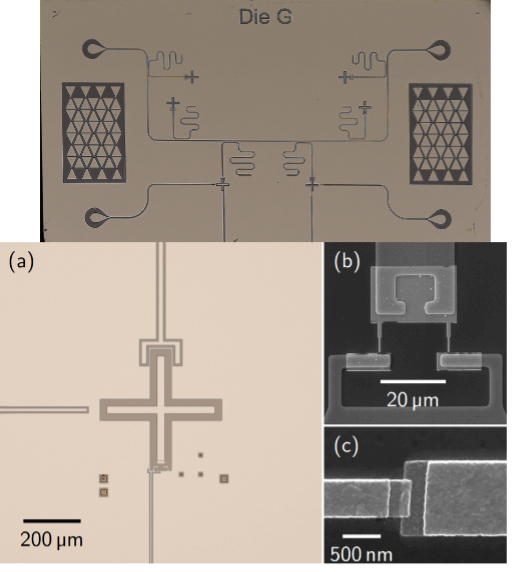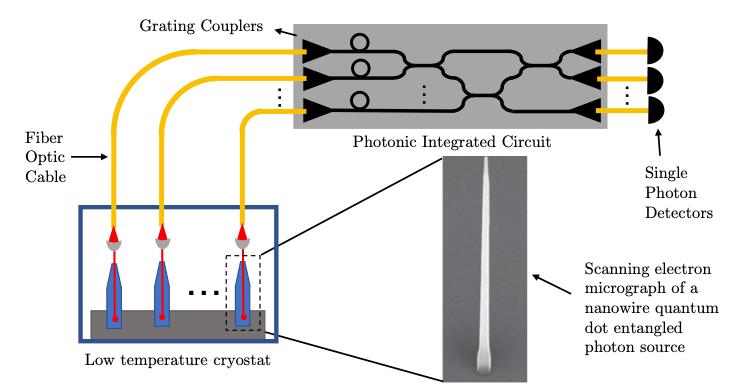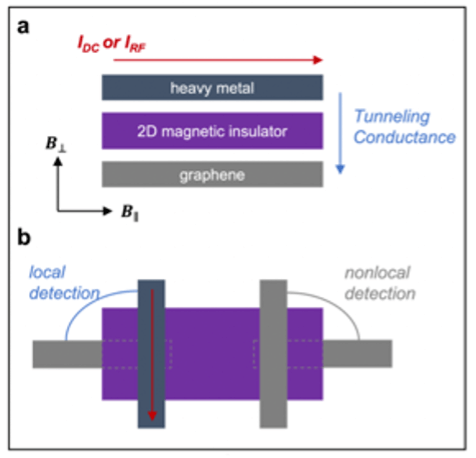
Building Blocks for Quantum Neuromorphic Computing: Superconducting Quantum Memcapacitors
Quantum neuromorphic computing (QNC) is a novel method that combines quantum computing with brain-inspired neuromorphic computing. Neuromorphic computing performs computations using a complex ensemble of artificial neurons and synapses (i.e., electrical circuits) to emulate the human brain. QNC may lead to a quantum advantage by realizing these components with quantum memory elements, or memelements, which […]
June 12, 2023

Enabling Next-Generation Sustainable Computing through Novel Multi-Valued-Logic Quantum Devices
As the demand for digital services grows, so does the need for data centres and transmission networks. Unfortunately, these data systems consume vast amounts of energy, resulting in nearly 1% of all energy-related greenhouse gas emissions. This project aims to invent novel quantum devices for highly energy-efficient computing that may help reduce the global digital […]
June 12, 2023

Photonic Quantum Processor
Photonic quantum processors based on integrated quantum photonic circuits require entangled photon pairs to perform quantum computations. However, current state-of-the-art technologies utilize probabilistic entangled photon sources with limited pair-extraction efficiencies, negatively affecting the computation speed. This project aims to boost the speed of on-chip quantum operations by using bright, on-demand entangled photon sources with an […]
April 24, 2023

Coherent magnon generation, magnon condensation, and quantum spin liquids via spin pumping in 2D magnets
Summary Developing hybrid quantum systems is essential to harnessing the complementary advantages of different quantum technology platforms. This necessitates the successful transfer of quantum information between platforms, which can be achieved, e.g., by harnessing magnons, or spin wave excitations, in magnetic materials. Decoherence due to uncontrolled coupling of qubits to the environment remains a fundamental […]
February 1, 2023
Advanced microwave electronics enabling quantum technologies
Summary Superconducting quantum computers require quantum-limited measurements at microwave frequencies in order to implement error correction. Conventionally, this is accomplished using near quantum-limited Josephson Parametric Amplifiers (JPAs). The JPAs require bulky ferrite-based circulators that prevent on-chip integration of the amplifiers with the processor and take up the majority of space and cooling power in the […]
April 1, 2020

Rydberg Atom Array Quantum Simulator
Summary Quantum simulators enable probing the static and dynamic properties of correlated quantum many-body systems that would otherwise be numerically inaccessible using classical simulators. We are developing quantum simulators based on arrays of neutral atoms excited to Rydberg states. Such Rydberg atom arrays are advantageous for simulating the dynamics of interacting spin systems (Ising spin […]
February 27, 2020

Reliably operating noisy quantum computers
Summary The overall goal of the project is to develop practical methods to be able to reliably run useful applications on near-term quantum computers. This requires identifying and overcoming the ubiquitous errors that currently limit quantum computing capabilities. Traditional methods of quantifying errors in quantum computers fail to predict how errors affect the output of […]
January 22, 2020

Quantum Material Multilayer Photonic Devices and Network
Summary Realizing highly integrated quantum photonic devices on a chip can enable new opportunities for photonic quantum computation. In this project, we explore heterostructures of stacked two-dimensional (2D) materials, such transition metal dichalcogenides (TMDC) or graphene, combined with optical microcavities as a platform for such devices. 2D materials are extremely thin and flexible, and have […]
December 12, 2019

Tuning Spin-Exchange Interactions in Low-Dimensional Metal Halide Perovskites: A New Class of Semiconductor Quantum Materials
Summary Leakage current in electronic components is one of the limiting factors for the performance of conventional computers which use charges and currents as physical information carriers. Spintronics offers an alternative by using electron spin for information transfer, processing and storage, enabling the design of non-volatile computer memory and more energy-efficient electronic devices. In this […]
October 1, 2019

Free-space Polarization-selective Microcavity based on Chiral Metasurfaces
Summary Developing a new type of Fabry-Pérot cavity that allows improved control of the atoms’ emission into the cavity mode will result in enhancement of the efficiency and fidelity of quantum state transfer from photons to atoms and back. This in turn can be used to improve the performance of quantum networks and repeaters, as […]
September 19, 2019
QuantumIon: an open-access quantum computing platform
Summary Trapped ions are one of the most advanced technologies for quantum computing, offering multi-qubit control in a universal quantum computing architecture and the ability to perform calculations with unprecedented precision. In this project we construct a shared trapped-ion quantum computing platform, QuantumIon, that will enable a broader and interdisciplinary scientific community to access an […]
September 9, 2019
Novel Superconducting Qubits for Error-Corrected Processors
Summary In this project, we develop novel superconducting qubits for error-corrected processors to enable large-scale quantum computing. Our design efforts will specifically target error-corrected architectures through a variety of paths. Possible features will include built-in parity measurements and the use of bosonic codes, such as Fock state and Cat codes, as our starting focus. Early […]
June 26, 2019

Quantum Simulations of Fundamental Interactions
Summary To address questions in modern physics such as “what is the structure of matter inside neutron stars?” we need better computational methods to evaluate the interplay of fundamental forces between elementary particles. To-date the response to such questions rests on numerical computer simulations that are inherently limited. In this project, we develop new theoretical […]
April 18, 2019

Quantum Computational Resources in the Presence of Symmetry
Summary Fault-tolerance is essential to the performance of quantum technologies, but known schemes are extremely resource intensive. Thus, improving existing schemes or inventing new schemes is of central importance. This joint project is based on the realization that fault-tolerance schemes make use of symmetries in fundamental ways, and that studying the problem of fault tolerance […]
March 13, 2019

Materials for Majorana-based Topological Qubits
Summary Topological qubits offer a novel pathway to scalable quantum computing by simultaneously allowing for ease of coupling between qubits and strong decoupling of qubits from noise and dissipation. The most promising direction explores the topologically induced protection of theoretically predicted exotic quasiparticles, the so-called Majorana Zero Modes or MZMs. To-date MZMs, which follow […]
January 28, 2019

Composite Superconductors for Improved Quantum Coherence
Summary Conventional superconductors have trouble performing well in magnetic fields required for electron spin resonance (ESR) – based quantum information processing applications. We can, however, use proximity engineering to select desired properties from different materials and combine them for improved superconducting performance in magnetic fields — an improvement that would have strong implications for […]
December 12, 2018

Topological Properties of Exciton-Polaritons in a Kagome Lattice as a Solid-state Quantum Simulator
Summary In this project, we build a solid-state quantum simulator for engineering a specific Hamiltonian. Quantum simulators are purpose-built devices with little to no need for error correction, thereby making this type of hardware less demanding than universal quantum computers. Our platform consists of exciton-polariton condensates in multiple quantum-wells sandwiched in a semiconductor Bragg […]
December 8, 2018

Hybrid Quantum Materials towards Topological Quantum Computing
Summary Proximity engineered hybrid materials have shown promise for topological quantum information processing. This form of quantum computing provides a stable, error-tolerant approach for building scalable quantum information processors. Topological quantum computing relies on braiding non-Abelian particles, such as Majorana fermions, which do not exist in nature. One can however use materials engineering to […]
December 8, 2018

Silicon Platform for Electron Spin Qubits
Summary Scaling solid-state quantum processors to a useful threshold while maintaining the requisite precision in quantum control remains a challenge. We propose a quantum metal-oxide-semiconductor (QMOS) architecture operating at cryogenic temperatures that is based on a network/node approach as a means to scalability. By working with QMOS, we benefit from the deep investments and […]
December 7, 2018

Inverse Photoemission Spectroscopy of Quantum Materials
Summary Quantum materials that exhibit strong electron correlations lead to phenomena, such as superconductivity and topologically protected states, that are important for quantum computation, sensing, and other applications. For example, we may utilize symmetry protected topological states to make qubits that are robust against decoherence, while advances in high temperature superconductors may significantly reduce […]
September 20, 2018

